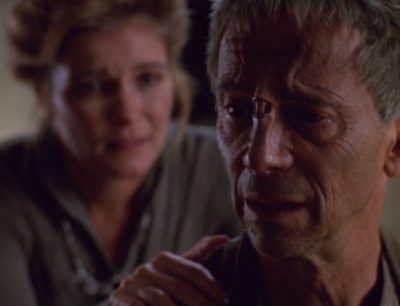I was really excited to see how the Star Trek: Discovery episode titles translated into French and amis, I figured with longer and more complicated titles, we’d get more diverging translations. But I was dead wrong!

In fact they’re almost all exactly the same as the English. Most of the divergences are super small, like for “The Butcher’s Knife Cares Not for the Lamb’s Cry” we get “worries not” instead of “cares not” and for “Into the Forest I Go” it’s more like “Deeper (enfoncer) Into the Forest I Go.”
“That Hope is You” became “Cet espoir, c’est vous” (That hope, it’s you) and “Far From Home” became “Loin de chez nous” (Far from our home) – so yeah, kind of splitting hairs here.

Then there were a few where the name changed a bit more but it really didn’t change the meaning at all, like “Une ambition démesurée” (inordinate or unmatched ambition) for “Vaulting ambition” (not the translation usually used in Macbeth).

“If Memory Serves,” the one where they go to Talos IV, became “Le Pouvoir de la mémoire” (The Power of Memory).
And in a particularly remarkable translation where the French is actually shorter than the English we got “Troubler l’esprit des sages” (To trouble the mind/spirit of the sages/wise men) for “Magic to Make the Sanest Man Go Mad.”
There are a few episodes where there’s a bit more of a change in meaning. First up, “The Wolf Inside,” which became “Le Loup de feu” (The Wolf of Fire or The Fire Wolf).
Instead of “The War Without, The War Within” we got “La Guerre, rien que la guerre” (The war, nothing but the war).
“Will You Take My Hand?” became “Le Luxe des principes moraux” (The Luxury of Moral Principles), which I kind of love.

In Season 4 there are two notable changes. “Stormy Weather” became “Tourmente” (storm, without reference to the old jazz standard) and “Coming Home” became “Retour au bercail.”

Retour au bercail does literally mean homecoming, but if you were going to say “I’m returning home” in normal speech you’d be more likely to use the phrase “rentrer chez moi/chez nous” or just “rentrer.” Retour au bercail as a phrase is significant because it is also used to mean “return to the fold” as in the parable of the Good Shepherd who is willing to lay down his life for his sheep. It’s also the translation of the English movie title Homeward Bound but I’m guessing they’re going for more of the “return to the fold” significance.










